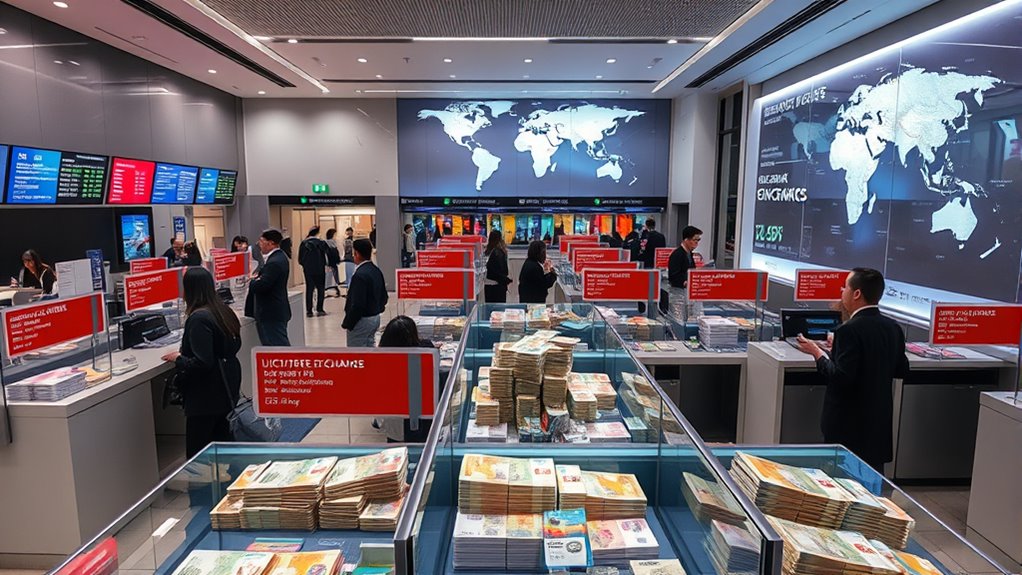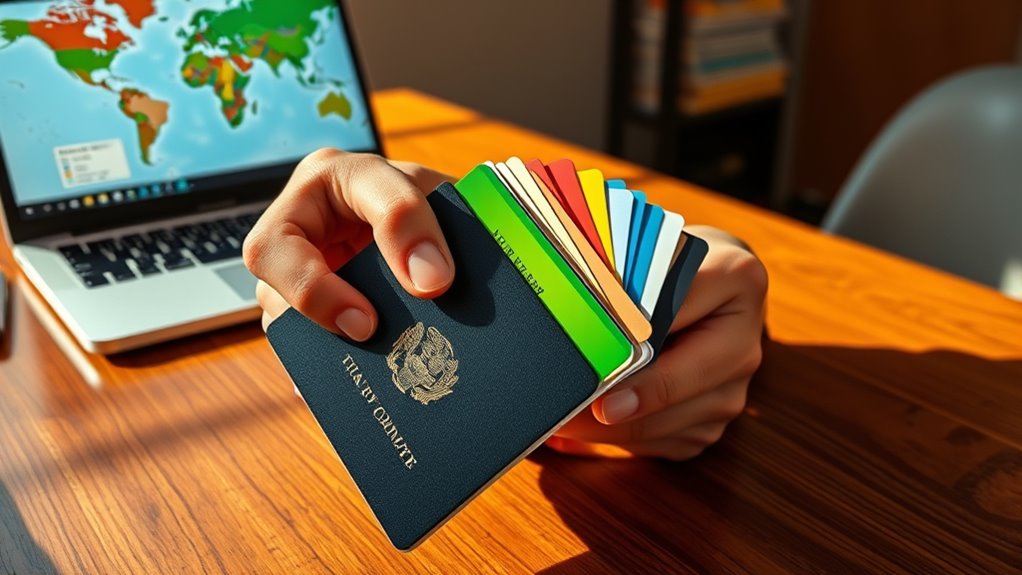To keep your accounts straight across multiple countries, you need to follow strict compliance and regulatory guidelines, including international standards like Basel III and local laws. Make sure to verify licensing, monitor risk management practices, and conduct thorough due diligence on transactions. Staying organized with proper record-keeping and understanding the specific requirements of each jurisdiction helps avoid legal issues and penalties. Continuing will show you how to navigate these complexities effectively.
Key Takeaways
- Maintain detailed records of accounts, transactions, and compliance requirements for each country.
- Use centralized banking platforms or software to track multi-jurisdictional accounts and activities.
- Ensure adherence to local licensing, reporting, and anti-money laundering regulations in every country.
- Regularly review and update compliance policies to align with international standards and local laws.
- Establish clear communication channels between branches and regulators across jurisdictions for seamless oversight.

Have you ever wondered how banks operate smoothly across different countries? It’s a complex process that involves steering a web of international regulations, local laws, and compliance standards. When banks expand beyond their home countries, they must follow a set of global guidelines while also adapting to local requirements. The foundation of this system is Basel III, an international regulatory framework that sets standards for capital adequacy, risk management, and liquidity. It aims to strengthen the global banking system by ensuring banks maintain sufficient capital buffers and manage risks effectively. The Basel Committee on Banking Supervision (BCBS), along with the Financial Stability Board (FSB), coordinates these standards, which are then adopted and enforced by individual national regulators. These standards are designed to ensure financial stability and protect depositors worldwide.
Basel III sets global standards for banking capital, risk management, and liquidity regulation.
If you’re working with a bank that operates internationally, you’ll notice it has to meet both global and local regulations. This often means creating tailored compliance frameworks for each jurisdiction. These frameworks cover key areas like anti-money laundering (AML), counter-terrorism financing (CFT), and adherence to international sanctions. Local regulators play a crucial role—they grant licenses, supervise daily operations, and enforce compliance to make sure banks meet both domestic and international standards. This process ensures banks stay transparent and accountable across borders.
Getting started involves licensing and authorization. Before a bank can operate in a country, it must register with the relevant regulatory authority and obtain a license. This process typically requires proof of financial stability, operational readiness, and compliance with local laws. Once licensed, banks face ongoing supervision—regular reporting, audits, and other checks—to maintain their license. If they fail to comply, the consequences can be severe, including losing their license, hefty fines, or legal penalties. Cross-border banking adds another layer of complexity, often requiring additional approvals and disclosures to meet multiple jurisdictions’ standards.
To manage risks and stay compliant, multinational banks develop extensive risk management programs. These include policies on AML, CFT, sanctions, data privacy, and ethical conduct. They must align with both local regulations and international best practices from organizations like FATF, OECD, and the Wolfsberg Group. Because they serve diverse clients and conduct transactions worldwide, these banks must be vigilant about operational and reputational risks. Regular training sessions and internal audits help guarantee staff stay updated on changing regulations and that the bank’s practices remain compliant.
Cross-border transactions demand strict adherence to regulations in both the sending and receiving countries. Banks conduct thorough due diligence on foreign clients and partners, monitoring transactions for suspicious activity. They use specialized tools to screen transactions against international sanctions and embargo lists and document everything meticulously. Standards for record-keeping, reporting, and documentation vary by jurisdiction, requiring banks to stay alert and adaptable. All these efforts work together to keep accounts straight and ensure international banking runs smoothly across borders.
Frequently Asked Questions
How Do International Banking Fees Vary Between Countries?
International banking fees differ markedly between countries, influenced by local regulations, currency exchange rates, and banking infrastructure. You might face higher charges for cross-border transactions in some nations, while others offer lower or no fees to attract foreign clients. Banks also vary in their fee structures, such as maintenance fees, ATM charges, and transfer costs. Always compare local fees before opening accounts abroad to avoid unexpected expenses and manage your finances effectively.
What Are the Best Practices for Currency Exchange?
Imagine you’re a traveler crossing borders like a river, and your currency exchange is your boat. To navigate smoothly, compare rates online before exchanging, avoid airport kiosks, and use ATMs in local banks for better rates. Keep an eye on fees, and consider multi-currency accounts when possible. These strategies guarantee your funds flow seamlessly across borders, helping you avoid hidden costs and stay financially afloat.
How Can I Avoid Double Taxation on International Accounts?
You can avoid double taxation on international accounts by utilizing tax treaties between your home country and the foreign country, which often include provisions to prevent double taxation. Make sure to claim foreign tax credits or exemptions available for income earned abroad. Keep detailed records of all foreign income and taxes paid. Consulting a tax professional familiar with international banking guarantees you maximize benefits and remain compliant with all relevant tax laws.
What Security Measures Protect International Online Banking?
Think of international online banking security as your digital fortress. You protect it with strong, unique passwords, enable two-factor authentication, and keep your software updated. Avoid public Wi-Fi and suspicious links, and regularly monitor your accounts for unauthorized activity. Banks also use encryption to safeguard your data and intrusion detection systems to block threats. These measures work together like a vigilant guard, keeping your money safe across borders.
How Do I Resolve Disputes With Foreign Banks?
When resolving disputes with foreign banks, you should first contact their customer service to explain the issue clearly and provide supporting documentation. If unresolved, escalate the matter to their dispute resolution department or local banking authority. Keep detailed records of all communications and transactions. If necessary, seek assistance from your home bank or legal advisors to navigate international banking regulations and guarantee your rights are protected.
Conclusion
So, you thought juggling multiple bank accounts across countries would be simple? Turns out, keeping everything straight isn’t just a hassle—it’s almost an art form. You plan, you organize, and still, one wrong move can turn your financial world upside down. But hey, isn’t that the charm? After all, what’s life without a little chaos—especially when it’s wrapped up in international banking? Now, sit back and enjoy the global financial dance.








